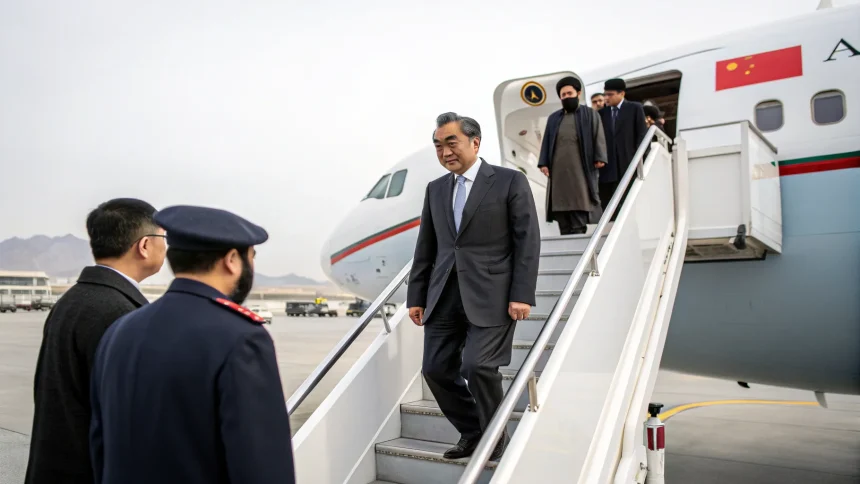Chinese Foreign Minister Wang Yi landed in Afghanistan on Wednesday, marking a significant diplomatic engagement between the two neighboring countries. The visit was confirmed in an official statement released by China’s Ministry of Foreign Affairs.
This high-level diplomatic mission comes at a time when Afghanistan continues to navigate complex international relations following the Taliban’s return to power in August 2021. Wang’s visit represents one of the most senior foreign officials to travel to Afghanistan since the change in government.
China-Afghanistan Relations
Wang’s arrival signals China’s ongoing diplomatic engagement with Afghanistan’s current leadership. China has maintained diplomatic channels with Afghanistan while many Western nations have limited their official contact with the Taliban government.
Beijing has previously expressed interest in Afghanistan’s stability, particularly as it shares a small border with China’s western Xinjiang region. Chinese officials have consistently emphasized regional security concerns, including preventing Afghanistan from becoming a base for groups that could affect stability in neighboring countries.
Economic interests also likely factor into the relationship, as Afghanistan possesses significant mineral resources that could potentially align with Chinese development initiatives in the region.
Regional Implications
The visit occurs against a backdrop of shifting regional dynamics in Central and South Asia. China has been working to expand its influence through various diplomatic and economic initiatives across the region.
Wang’s presence in Kabul may indicate China’s willingness to play a larger role in Afghanistan’s reconstruction and development. Since 2021, China has provided humanitarian assistance to Afghanistan while calling for the unfreezing of Afghan assets held abroad.
The timing of this visit could also reflect China’s strategic positioning as it navigates relationships with various regional powers including Pakistan, Iran, and Russia – all countries with interests in Afghanistan’s future.
International Response
The international community will likely monitor this visit closely, as it may signal shifting approaches to engagement with Afghanistan’s current government. China’s willingness to conduct high-level diplomatic exchanges contrasts with the more cautious approach adopted by many Western nations.
Key areas of potential discussion during Wang’s visit might include:
- Security cooperation and border management
- Economic assistance and potential investment
- Afghanistan’s role in regional connectivity initiatives
- Humanitarian aid coordination
No details were immediately available regarding the specific agenda for Wang’s meetings in Afghanistan or which officials he planned to meet during his stay.
This visit represents the most significant Chinese diplomatic engagement with Afghanistan in recent months and may indicate Beijing’s readiness to deepen bilateral relations. As Afghanistan continues to face humanitarian and economic challenges, China’s approach to engagement could influence how other nations recalibrate their own policies toward the country.









